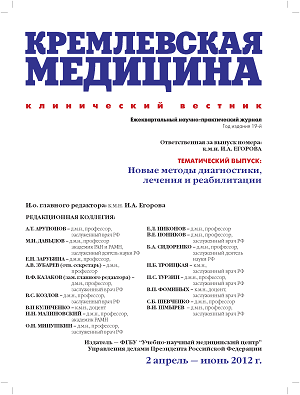Изучение течения неэрозивной формы гастроэзофагеальной рефлюксной болезни у больных язвенной болезнью двенадцатиперстной кишки после эрадикации Helicobacter pylori
Гастроэнтерология
Дата публикации: декабря 8, 2014
Аннотация
Влияние эрадикационной терапии больных язвенной болезнью двенадцатиперстной кишки (ЯБДК) на течение со-путствующей гастроэзофагеальной рефлюксной болезни (ГЭРБ) не достаточно исследовано. Изучалось течение неэро-зивной формы рефлюксной болезни (НЭРБ) у 51 больного ЯБДК после успешной эрадикации. Контрольную группусоставили 27 человек с неэффективной эрадикационной терапией. Проведенное исследование показало, что успешноеэрадикационное лечение больных ЯБДК в 56,8% случаев приводило к уменьшению или исчезновению клинических сим-птомов ГЭРБ. Частота развития эрозивных форм ГЭРБ была одинаковой в основной и контрольной группе. Это говорито том, что эрадикационная терапия не влияла на развитие эрозивного эзофагита (ЭЭ). Последующее наблюдение втечение 3 лет за больными с развившимся ЭЭ после эффективной эрадикационной терапии показало, что в 70% случаевнаблюдалось исчезновение эрозий пищевода даже при отсутствии какого-либо лечения.Ключевые слова: гастроэзофагеальная рефлюксная болезнь, эрадикационная терапия, язвенная болезнь две-надцатиперстной кишки, течение неэрозивных форм ГЭРБ.Effects of eradication therapy at the course of accompanying gastroesophageal reflux disease (GERD) in patients withduodenal ulcer (DU) has not been studied well enough yet. The course of nonerosive forms of reflux disease after successfuleradication was studied in 51 patient. In the control group there were 27 patients with ineffective eradication therapy. The studyperformed has shown that the successful eradication therapy in patients with duodenal ulcer had resulted in the reduction anddisappearance of UD clinical symptoms in 56.8% of cases. The incidence of GERD erosive forms was similar both in the studiedand control groups. It indicated that eradication therapy had not any effects at the development of erosive esophagitis. 3-yearfollow-up of patients with developed erosive esophagitis after successful eradication therapy has shown that in 70% of casesesophageal erosive lesions disappeared without any treatment.Key words: gastroesophageal reflux disease, eradication therapy, duodenal ulcer disease, course of nonerosive form ofgastroesophageal reflux disease.Литература
1. Delaney B., Moayyedi P., Hunt R. Eradicating H pylori
does not increase symptoms of gastro-oesophageal reflux disease.
BMJ 2004; 328:1388-1389 (12 June).
2. Hampel H. N., Abraham S., El-Serag H.B. Meta-analysis:
obesity and the risk for gastroesophageal reflux disease and its
complications / Ann. Intern. Med. 2005. - V. 143. - P. 199-211.
3. Katz P.O., Lehrer J.K. GERD in Women. New England
Journal of Medicine, January, 9, 2012.
4. Kupcinskas L., Jonaitis L., Kiudelis G. A 1 year followup
study of the consequences of Helicobacter pylori eradication in
duodenal ulcer patients: unchanged frequency of erosive oesophagitis
and decreased prevalence of non-erosive gastro-oesophageal reflux
disease. Eur J Gastroenterol Hepatol. 2004 Apr;16(4):369-74.
5. Labenz J., Armstrong D., Zetterstrand S., Eklund S.,
Leodolter A. Clinical trial: factors associated with freedom from
relapse of heartburn in patients with healed reflux oesophagitis-
-results from the maintenance phase of the EXPO study. Aliment
Pharmacol Ther. 2009 Jun 1;29(11):1165-71. Epub 2009 Mar 2.
6. Leodolter A., Wolle K., Peitz U. et al. Helicobacter pylori
arid expression of gastritis in erosive gastro-oesophageal reflux
disease. Scand J Gastroenterol 2003; 38: 498-502.
7. Moon W. Clinical characteristics and risk factors of reflux
esophagitis: comparison with nonerosive reflux disease. Korean J
Gastroenterol. 2011 May 25; 57(5):269-71.
И др. авторы.
does not increase symptoms of gastro-oesophageal reflux disease.
BMJ 2004; 328:1388-1389 (12 June).
2. Hampel H. N., Abraham S., El-Serag H.B. Meta-analysis:
obesity and the risk for gastroesophageal reflux disease and its
complications / Ann. Intern. Med. 2005. - V. 143. - P. 199-211.
3. Katz P.O., Lehrer J.K. GERD in Women. New England
Journal of Medicine, January, 9, 2012.
4. Kupcinskas L., Jonaitis L., Kiudelis G. A 1 year followup
study of the consequences of Helicobacter pylori eradication in
duodenal ulcer patients: unchanged frequency of erosive oesophagitis
and decreased prevalence of non-erosive gastro-oesophageal reflux
disease. Eur J Gastroenterol Hepatol. 2004 Apr;16(4):369-74.
5. Labenz J., Armstrong D., Zetterstrand S., Eklund S.,
Leodolter A. Clinical trial: factors associated with freedom from
relapse of heartburn in patients with healed reflux oesophagitis-
-results from the maintenance phase of the EXPO study. Aliment
Pharmacol Ther. 2009 Jun 1;29(11):1165-71. Epub 2009 Mar 2.
6. Leodolter A., Wolle K., Peitz U. et al. Helicobacter pylori
arid expression of gastritis in erosive gastro-oesophageal reflux
disease. Scand J Gastroenterol 2003; 38: 498-502.
7. Moon W. Clinical characteristics and risk factors of reflux
esophagitis: comparison with nonerosive reflux disease. Korean J
Gastroenterol. 2011 May 25; 57(5):269-71.
И др. авторы.
